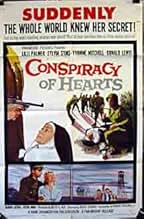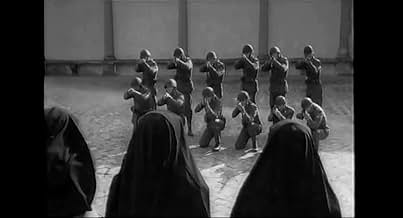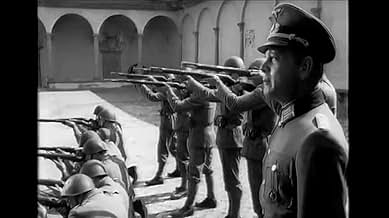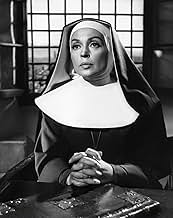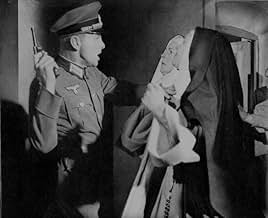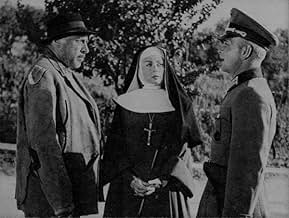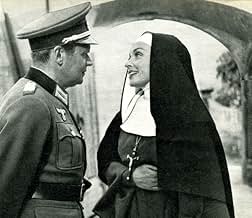NOTE IMDb
7,1/10
586
MA NOTE
Ajouter une intrigue dans votre langueCatholic nuns risk their lives to help Jewish children in an Italian internment camp escape to Palestine during World War II.Catholic nuns risk their lives to help Jewish children in an Italian internment camp escape to Palestine during World War II.Catholic nuns risk their lives to help Jewish children in an Italian internment camp escape to Palestine during World War II.
- Réalisation
- Scénario
- Casting principal
- Récompenses
- 1 nomination au total
Avis à la une
I worry that at some time in the not too distant future the extent of the evil perpetrated during the 1930s and 40s will be forgotten. Watch this film and remind yourself that unless all good people stand strong, every day and every hour, these sort of events will keep happening, over and over again.
In this shocking (certainly for 1960), depressing, heart-breaking, uplifting and surprisingly honest movie, we see that it is only through individuals taking personal responsibility for their actions that we can have any hope of building a world fit for our children.
When I see films like this, and read the positive response from reviewers on IMDb, I still have some hope for the future.
In this shocking (certainly for 1960), depressing, heart-breaking, uplifting and surprisingly honest movie, we see that it is only through individuals taking personal responsibility for their actions that we can have any hope of building a world fit for our children.
When I see films like this, and read the positive response from reviewers on IMDb, I still have some hope for the future.
I first saw this film at the Mile End Odeon in East London when I was a kid. I was with a couple of friends and we thought that this film would be just another British war film. However, Mile End in those days still had a reasonably large Jewish population and older people all around us kids were openly weeping throughout the showing of the film. Later, in the foyer a woman told us that her family had been killed during the Hollocaust. A saw this film again quite recently on television and it really is quite a remarkable film. The characters have real depth and the the story about nuns sheltering Jewish children from the Nazis in Italy during World War II is not sentimentalised. The sub-plot concerning an unrequited love story between an Italian officer and a novice nun is is really well presented and does not intrude on the main story concerning Nazi ruthlessness and brutality towards the Jewish children and the nuns.
10gelashe
I saw this movie as a little girl with my mom. I was too young to understand or appreciate it. I got the opportunity to see it in my twenties and never forgot it. The last time it was shown, I taped it and have never seen it on T. V. again.
The courtyard scene at the end is what I remember most. Other memorable scenes are: the nuns hiding the children at the bottom of the farmer's wheelbarrel while a Nazi officer stabs a pitchfork into it to make sure it is really garbage underneath, the German nun who was angry at hiding the children at the beginning, later winds up saving one of them by hiding her under her habit and the beginning of the film when the nuns asked a little girl her name, and she replies "Jew Dog". She said she had been called that so many times by the Germans that she forgot her real name, and at Yom Kippur when the children read the names of their families who are all dead. This is a wonderful movie. It is a shame it is not available on video or shown on cable.
Lily Palmer as the Mother Superior is outstanding especially noting her beauty.
The courtyard scene at the end is what I remember most. Other memorable scenes are: the nuns hiding the children at the bottom of the farmer's wheelbarrel while a Nazi officer stabs a pitchfork into it to make sure it is really garbage underneath, the German nun who was angry at hiding the children at the beginning, later winds up saving one of them by hiding her under her habit and the beginning of the film when the nuns asked a little girl her name, and she replies "Jew Dog". She said she had been called that so many times by the Germans that she forgot her real name, and at Yom Kippur when the children read the names of their families who are all dead. This is a wonderful movie. It is a shame it is not available on video or shown on cable.
Lily Palmer as the Mother Superior is outstanding especially noting her beauty.
Ralph Thomas and Betty Box belong so firmly to the tale of the British cinema's protracted postwar decline, and their output runs so much to cheerful mediocrity and worse, that it would be churlish not to salute this exception.
A film about a mixed European bag of nuns in sunny Italy, sheltering Jewish children from nasty German occupiers, could have easily wound up as sticky or preachy as a Hollywood movie of the week or after-school special "endorsed by the National Education Association". This production does quite a bit better.
To begin with, the couple took the commercially bold decision to shoot in dramatically suitable monochrome (Rank was very into Technicolor) despite the temptation of those gorgeous locations near Florence. Next, Rank's addiction to polyglot casts proves acceptable, since the nunnery and the Cahtholic church are multinational, as is the war situation: the convention of Colonel Albert Lieven talking in Teutonically accented English and others in Italianate English does not distract.
Thirdly, the cast is well chosen. Sylvia Syms, a rising English rose, was the novice. Michael Goodliffe was a familiar officer/vicar type, decent and tense as the nuns' protective priest. Lilli Palmer, that quintessentially cosmopolitan star, is apt (if a little too soigne) as Mother Superior. Ronald Lewis as the Italian major torn between allegiance to the Axis and revulsion at its persecutions, patronised by Lieven and a worm about to turn, is his customary sombre self. (Both Lewis and Goodliffe were suicides).
Fourthly, the mise-en-scene is ideal for moral conflicts: sunny exteriors and open hillsides against the shadowy cloister and catacombs where the hunt for hidden escapees from a concentration camp culminates. Thomas is no Bresson or da Sica, but he makes good use of his lighting cameraman, and in his workmanlike way keeps the tension boiling. The religious angle (with its dilemmas of obedience, confession and incompatible loyalties) is deftly threaded through the chase to raise the tone.
For a 'U'-certificated production there is an unholy amount of screen time leading up to, and about, killings and executions: it's about younger children but not for them.
As always, Box and Thomas are craftsmanlike, most to be praised for the mistakes and ineptitudes they avoid.
This is not "The Sound of Music" sans music. The storyline is not muffled by subplots, the enemy are not caricatured (Lieven convincingly depicts a non-Nazi career officer, forced into exemplary cruelty by his force's isolation amid partisans) and the slither into sentimentality is avoided nearly all the time. This is the price the script willingly pays for not characterising the children much; on the other hand, the issue of whether nuns gladly harboured Jews and made concessions to Judaism under a Christian roof is not shirked.
Adrian Scott, a member of the Hollywood Ten, outlined a plot based on real incidents which was worked up by Marsha Hunt's longtime husband, Robert Presnell Jr. It was unusual for the Pinewood team to work with Americans, who may have helped keep the film's political aspects uppermost-- and, as it were, salted it with some asperity, so that it plays pretty smartly and kitsch-free today.
Barney Balaban of Paramount saw its premiere while in London and paid Rank handsomely for the rights on impulse. The film fared well in an America not yet used to stories of Nazi anti-Jewish actions: the Auschwitz trial and Eichmann's capture would soon make them too familiar. In Britain, "Conspiracy of Hearts" was one of 1960's top grossers alongside Ralph's and Betty's latest "Doctor" film. Sadly, the latter would be much more typical of them thereafter.
A film about a mixed European bag of nuns in sunny Italy, sheltering Jewish children from nasty German occupiers, could have easily wound up as sticky or preachy as a Hollywood movie of the week or after-school special "endorsed by the National Education Association". This production does quite a bit better.
To begin with, the couple took the commercially bold decision to shoot in dramatically suitable monochrome (Rank was very into Technicolor) despite the temptation of those gorgeous locations near Florence. Next, Rank's addiction to polyglot casts proves acceptable, since the nunnery and the Cahtholic church are multinational, as is the war situation: the convention of Colonel Albert Lieven talking in Teutonically accented English and others in Italianate English does not distract.
Thirdly, the cast is well chosen. Sylvia Syms, a rising English rose, was the novice. Michael Goodliffe was a familiar officer/vicar type, decent and tense as the nuns' protective priest. Lilli Palmer, that quintessentially cosmopolitan star, is apt (if a little too soigne) as Mother Superior. Ronald Lewis as the Italian major torn between allegiance to the Axis and revulsion at its persecutions, patronised by Lieven and a worm about to turn, is his customary sombre self. (Both Lewis and Goodliffe were suicides).
Fourthly, the mise-en-scene is ideal for moral conflicts: sunny exteriors and open hillsides against the shadowy cloister and catacombs where the hunt for hidden escapees from a concentration camp culminates. Thomas is no Bresson or da Sica, but he makes good use of his lighting cameraman, and in his workmanlike way keeps the tension boiling. The religious angle (with its dilemmas of obedience, confession and incompatible loyalties) is deftly threaded through the chase to raise the tone.
For a 'U'-certificated production there is an unholy amount of screen time leading up to, and about, killings and executions: it's about younger children but not for them.
As always, Box and Thomas are craftsmanlike, most to be praised for the mistakes and ineptitudes they avoid.
This is not "The Sound of Music" sans music. The storyline is not muffled by subplots, the enemy are not caricatured (Lieven convincingly depicts a non-Nazi career officer, forced into exemplary cruelty by his force's isolation amid partisans) and the slither into sentimentality is avoided nearly all the time. This is the price the script willingly pays for not characterising the children much; on the other hand, the issue of whether nuns gladly harboured Jews and made concessions to Judaism under a Christian roof is not shirked.
Adrian Scott, a member of the Hollywood Ten, outlined a plot based on real incidents which was worked up by Marsha Hunt's longtime husband, Robert Presnell Jr. It was unusual for the Pinewood team to work with Americans, who may have helped keep the film's political aspects uppermost-- and, as it were, salted it with some asperity, so that it plays pretty smartly and kitsch-free today.
Barney Balaban of Paramount saw its premiere while in London and paid Rank handsomely for the rights on impulse. The film fared well in an America not yet used to stories of Nazi anti-Jewish actions: the Auschwitz trial and Eichmann's capture would soon make them too familiar. In Britain, "Conspiracy of Hearts" was one of 1960's top grossers alongside Ralph's and Betty's latest "Doctor" film. Sadly, the latter would be much more typical of them thereafter.
I saw it when I was 8 years old, I'm almost 40 now and I always remember this movie. Catholic nuns in France, hiding Jewish children in their convent during the occupation. Lilli Palmer, I remember her face vividly. There must be a reason, but I can't find a copy of that film, not even on video. Maybe, I should keep the memory as it is, rather than jeopardizing it by seeing again, today. I couldn't sleep after I saw it. I think I lived that film. It happened to me another time, when I was around the same age. A Spanish movie, MARCELINO PAN Y VINO. Strangely enough, both films have religious roots and take place within the walls of convents and monasteries. I wonder what that means.
Le saviez-vous
- AnecdotesIt was the 5th most popular film at the British box office in 1960.
- GaffesThroughout the scenes in which they appear, most of the nuns are wearing make-up. This would be most unlikely for nuns.
- Citations
German Soldier: Mother of God: I've killed a nun!
- ConnexionsFeatured in Film Profile: Betty Box and Ralph Thomas (1961)
Meilleurs choix
Connectez-vous pour évaluer et suivre la liste de favoris afin de recevoir des recommandations personnalisées
Détails
- Durée1 heure 53 minutes
- Couleur
- Mixage
- Rapport de forme
- 1.85 : 1
Contribuer à cette page
Suggérer une modification ou ajouter du contenu manquant

Lacune principale
By what name was Les conspiratrices (1960) officially released in Canada in English?
Répondre
